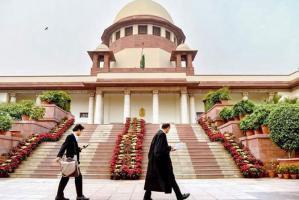The apex courts observation came during hearing of a plea by the Uttar Pradesh government to fell 2,940 trees for the Krishna Govardhan Road project in Mathura

Supreme Court
The Supreme Court on Wednesday wondered why felling of trees was necessary to widen roads or to keep them aligned in a straight line, and suggested that roads could instead be zigzag, which would help reduce speed of vehicles and save lives by avoiding accidents.
ADVERTISEMENT
A bench headed by Chief Justice SA Bobde said: "Why do roads have to be laid in a straight line by cutting trees? Keep the roads zigzag. It will reduce speed of vehicles, and also decrease road accidents and save many lives."
The observation came during hearing of a plea by the Uttar Pradesh government to fell 2,940 trees for the Krishna Govardhan Road project in Mathura.
The Chief Justice asked the state government to look at the value of trees in terms of oxygen supply they will provide in their lifetime, and then evaluate their importance.
The top court observed that though the Public Works Department had assured that it would compensate by planting similar number of trees in another area, felling of 90- year-old tree and then replacing it with a week-old sapling did not make sense.
"It is obvious that there cannot be compensatory reforestation if a 90- or 100-year-old tree is cut down," the court remarked.
"It is not possible for us to accept compensation in merely arithmetical terms, especially when there is no statement forthcoming from the Uttar Pradesh government or the PWD as to the nature of trees -- whether they are classified as shrubs or large trees," the bench said, citing absence of information or record in connection with the age of the trees proposed to be chopped.
"It is clear that the only effect, if the trees are retained, will be that the roads will not be straight and therefore incapable of high-speed traffic. Such an affect may not be necessarily deleterious," added the bench.
The Chief Justice told the counsel for Uttar Pradesh government and state PWD that the valuation of trees cannot be done in terms of timber, and instead they should be valued by taking into account their oxygen-producing capacity over their remaining life span, assuming they might be cut now.
The bench said that the UP government was to ascertain the total number of trees to be felled for building roads.
Acting as amicus curiae, advocate ADN Rao submitted before the top court that there was a method of Net Present Value for the evaluation of trees.
The court asked the Uttar Pradesh government to consider the NPV value and respond within two weeks. After a detailed hearing in the matter, the court posted the matter for further hearing after four weeks.
Keep scrolling to read more news
Catch up on all the latest Crime, National, International and Hatke news here. Also download the new mid-day Android and iOS apps to get latest updates.
Mid-Day is now on Telegram. Click here to join our channel (@middayinfomedialtd) and stay updated with the latest news
This story has been sourced from a third party syndicated feed, agencies. Mid-day accepts no responsibility or liability for its dependability, trustworthiness, reliability and data of the text. Mid-day management/mid-day.com reserves the sole right to alter, delete or remove (without notice) the content in its absolute discretion for any reason whatsoever
 Subscribe today by clicking the link and stay updated with the latest news!" Click here!
Subscribe today by clicking the link and stay updated with the latest news!" Click here!






